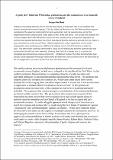Files in this item
A godly law? Bulstrode Whitelocke, puritanism, and the common law in seventeenth-century England
Item metadata
| dc.contributor.author | Rose, Jacqueline Elizabeth | |
| dc.date.accessioned | 2020-06-01T14:30:08Z | |
| dc.date.available | 2020-06-01T14:30:08Z | |
| dc.date.issued | 2020-06 | |
| dc.identifier | 260719802 | |
| dc.identifier | ce8f436f-2a7f-469b-8169-ebbed6e93f87 | |
| dc.identifier | 85085365366 | |
| dc.identifier.citation | Rose , J E 2020 , A godly law? Bulstrode Whitelocke, puritanism, and the common law in seventeenth-century England . in Studies in Church History . Studies in Church History , vol. 56 , Cambridge University Press , pp. 273-287 . https://doi.org/10.1017/stc.2019.15 | en |
| dc.identifier.issn | 0424-2084 | |
| dc.identifier.other | ORCID: /0000-0001-7019-294X/work/75248623 | |
| dc.identifier.uri | https://hdl.handle.net/10023/20024 | |
| dc.description.abstract | Debates surrounding both the church and the law played an important role in the conflicts that marked seventeenth-century England. Calls for reform of the law in the Civil Wars and Interregnum complicated the apparent relationship between puritanism and the common law, as the first fragmented and the second came under attack in the 1640s and 1650s. This article first analyses the common lawyer Bulstrode Whitelocke's historical and constitutional writings that defended the common law against demands for its reform and argued that its legitimacy derived from its origins in, and resemblances to, the law of Moses. Refraining from the radical application of this model employed by some contemporaries, Whitelocke instead turned to British history to make his case. This article then examines Whitelocke's views of the relationship between common law and ecclesiastical jurisdiction in his own day, showing how, both as a lawyer and as a puritan, he navigated laws demanding religious conformity. Whitelocke's career therefore demonstrates how lawyers could negotiate the fraught relationship between the church and the law in the aftermath of the reconfigurations provoked by the Civil Wars and Restoration. | |
| dc.format.extent | 340597 | |
| dc.language.iso | eng | |
| dc.publisher | Cambridge University Press | |
| dc.relation.ispartof | Studies in Church History | en |
| dc.relation.ispartofseries | Studies in Church History | en |
| dc.subject | BL Religion | en |
| dc.subject | K Law (General) | en |
| dc.subject.lcc | BL | en |
| dc.subject.lcc | K1 | en |
| dc.title | A godly law? Bulstrode Whitelocke, puritanism, and the common law in seventeenth-century England | en |
| dc.type | Book item | en |
| dc.contributor.institution | University of St Andrews. School of History | en |
| dc.contributor.institution | University of St Andrews. Centre for Global Law and Governance | en |
| dc.identifier.doi | 10.1017/stc.2019.15 | |
| dc.identifier.url | https://www.cambridge.org/core/journals/studies-in-church-history | en |
This item appears in the following Collection(s)
Items in the St Andrews Research Repository are protected by copyright, with all rights reserved, unless otherwise indicated.

